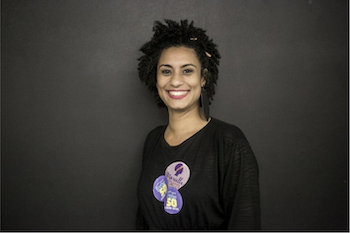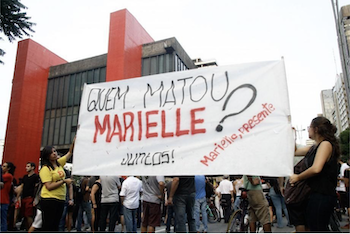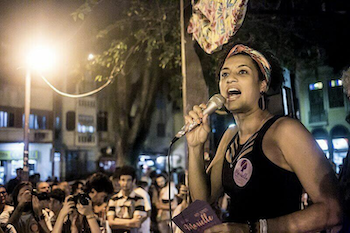
Marielle Francisco da Silva was born on July 27, 1979, in Rio de Janeiro, Brazil. She was raised by her parents Marinete and Antonio in Maré, Rio de Janeiro´s largest “favela.” A “favela” (slum) defines a poor location that lacks infrastructure, transportation, health services, and schools. These areas are known for their high crime rates, trafficking gangs, shootings, and social chaos. In fact, one in every five Rio residents resides in a “favela”. Franco’s family migrated from the Northeast of Brazil, one of the nation’s poorest regions, during the mid-20th century. Franco took care of her younger sister Anielle and began completing household chores when she was 11 due to economic hardships and familial responsibilities common in low-income households. While taking a year-long preparatory course run by the Non-Governmental Redes da Maré - a Brazilian organization focused on improving the quality of life in the Maré complex, a group of “favelas” in Rio de Janeiro - for Brazil´s college entrance exam, Franco gave birth to her daughter Luyara Santos at 19.
Determined, Franco re-enrolled the following year, passed the college entrance exam, and earned a scholarship to the Pontifical Catholic University of Rio in 2002, where she graduated in the Social Sciences. She earned a master's degree in public administration from Fluminense Federal University in 2012. Translated into English, her master's thesis was titled “UPP: The Decline of the Favela in Three Letters,” and it discussed security in Rio's “favelas.” However, in 2005, Franco’s friend was assassinated in Maré during a shootout between the police and drug traffickers. This event was crucial to drawing Franco into the world of politics. She soon joined Marcelo Freixo, a representative of the state of Rio de Janeiro for the Socialism and Liberty Party (PSOL), to form a part of his cabinet and participate in the Human Rights Commission. During her nearly ten years of working with Marcelo, she approached the human rights abuses in the state and positioned herself as a human rights activist. Franco contributed significantly to the Commission and the citizens of Rio, such by heading a campaign against military intervention in 2018 and releasing the “Genocide of the Black Population” report, a result of extensive research she made on police abuse.

As a bisexual Afro-Brazilian woman raised in a “favela,” Franco decided to fight for human rights in a campaign for Rio de Janeiro City Council. Her campaign´s motto was “I am because you are,” which conveyed principles of unity and representation. From the beginning, neither Monica nor Franco’s family supported her idea of running for the position because of the possible dangers. In 2016, she was elected to the Rio City Council with more than forty-five thousand votes, becoming the only black female among the 51 representatives. Some of her seven approved bills include the implementation of nurseries for children with absent families, the creation of the Day of the Black Woman and Tereza Benguela - a notable Brazilian figure known for the resistance against slavery - on July 25, the regulation of the work of “motorcycle taxi drivers,” and the Dossier Women´s report that included official information about abuse against women.
At around 9:30 pm on March 14, 2018, when Franco was returning from the political event "Young Black Women Moving Structures," unidentified attackers shot the car with Franco and her driver Anderson Pedro Gomes inside. She was hit four times in the head and died instantly. Furthermore, Anderson also died from the shots. As a result, Franco’s murder was a mystery that drew conspiracies and doubts. Franco opposed a military intervention ordered by Brazil's president Michel Temer one month prior. In the week she was executed, she accused two police officers from the Military Police Battalion of various crimes. The day before, Franco published a message on Twitter questioning the number of deaths that would be necessary to end this war, referring to the murder of Matheus Melo (who was killed by the military police while leaving the church). Further contributing to a controversial death, the bullets used to kill her were initially sold to the Federal Police. Many believe the crime was committed to silence Franco and stop her advocacy of women's rights, black people, favela inhabitants, and the LGBTQ+ community.

The next day, on March 15, 2018, protests took place worldwide, and approximately 100,000 people participated in Rio to honor Franco and Anderson's memory. Franco's girlfriend left her job as an architect to pursue justice for the two; her family continued her political and social fight, becoming activists similar to her. She was honored by various journals such as "The New York Times," "The Guardian," "Le Monde," and "Al Jazeera." The Instituto Marielle Franco, a non-profit organization with the mission of empowering black women and LGBTQIA+ people to fight for a more egalitarian world, was founded by her family following Franco’s death. The organization conducts campaigns to raise awareness about issues such as racial discrimination and gender inequality, supports victims of police violence and their families, and organizes workshops, seminars, and educational programs to empower community members to advocate for their rights. Hence, the Instituto Marielle Franco was established to honor the legacy of Marielle Franco and continue her work in advocating for human rights, social justice, and the empowerment of marginalized communities.
Why Did I Choose to Research Marielle Franco?
I chose to research Marielle Franco because, although many know about her murder, they are unaware of her personal life, accomplishments, goals, and role in political affairs. Franco's powerful advocacy inspires people of all different backgrounds to fight for her justice. I want to tell her story to educate other young people about her achievements and empower women, LGBTQ+ youth, and others she helped.
Works Cited
OpenDemocracy. (2019, March 20). The life and battles of Marielle Franco. Retrieved from https://www.opendemocracy.net/en/democraciaabierta/life-and-battles-marielle-franco/
Global Initiative. (2018, March 14). Marielle Franco. Retrieved from https://assassination.globalinitiative.net/face/marielle-franco
BlackPast. (2018, April 3). Marielle Franco. Retrieved from https://www.blackpast.org/global-african-history/franco-marielle-1979-2018/
We Need to Talk. (2021, May 31). The Murder of Marielle Franco. Retrieved from https://www.weneedtotalk.news/murder-marielle/
Politize. (2020, July 6). Quem foi Marielle Franco? Conheça a sua história. Retrieved from https://www.politize.com.br/quem-foi-marielle-franco/
Projeto Colabora. (2018, March 18). “Não vamos parar de cobrar justiça.” Retrieved from https://projetocolabora.com.br/ods5/justica-por-marielle-franco/
Acegis. (2018, March). Marielle Franco, Presente! O mundo não se cala. Retrieved from https://www.acegis.com/2018/03/marielle-franco-presente-o-mundo-nao-se-cala/
The New York Times. (2018, March 15). Killing of Rio de Janeiro Councilwoman Critical of Police Rattles Brazil. Retrieved from https://www.nytimes.com/2018/03/15/world/americas/killing-of-rio-de-janeiro-councilwoman-critical-of-police-rattles-brazil.html
Instituto Marielle Franco. Retrieved from https://www.institutomariellefranco.org
This article was published on 7/5/24